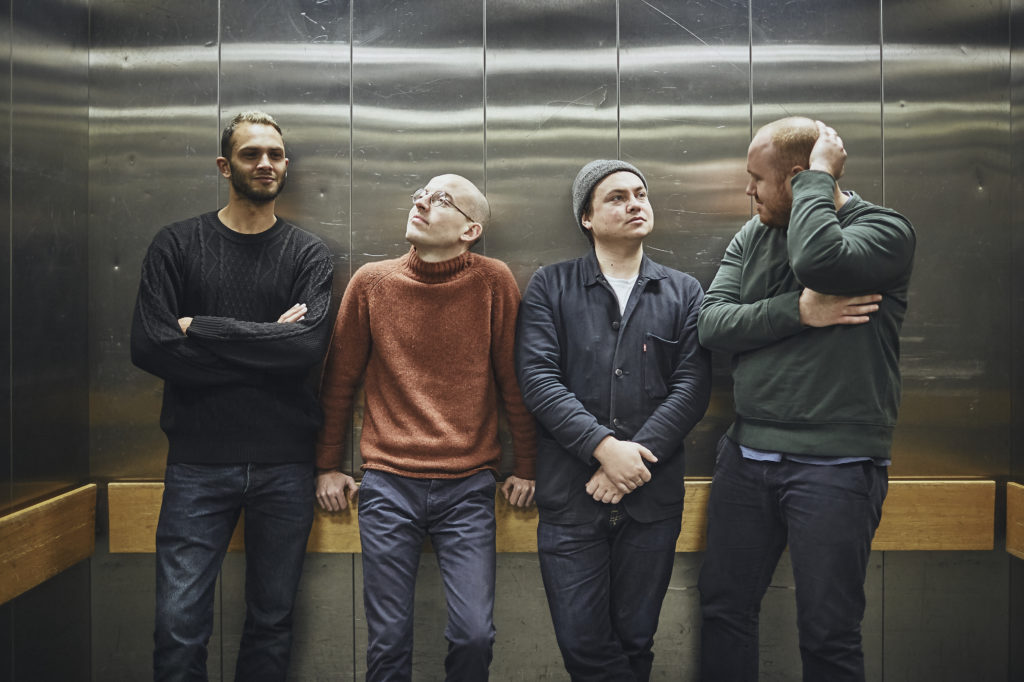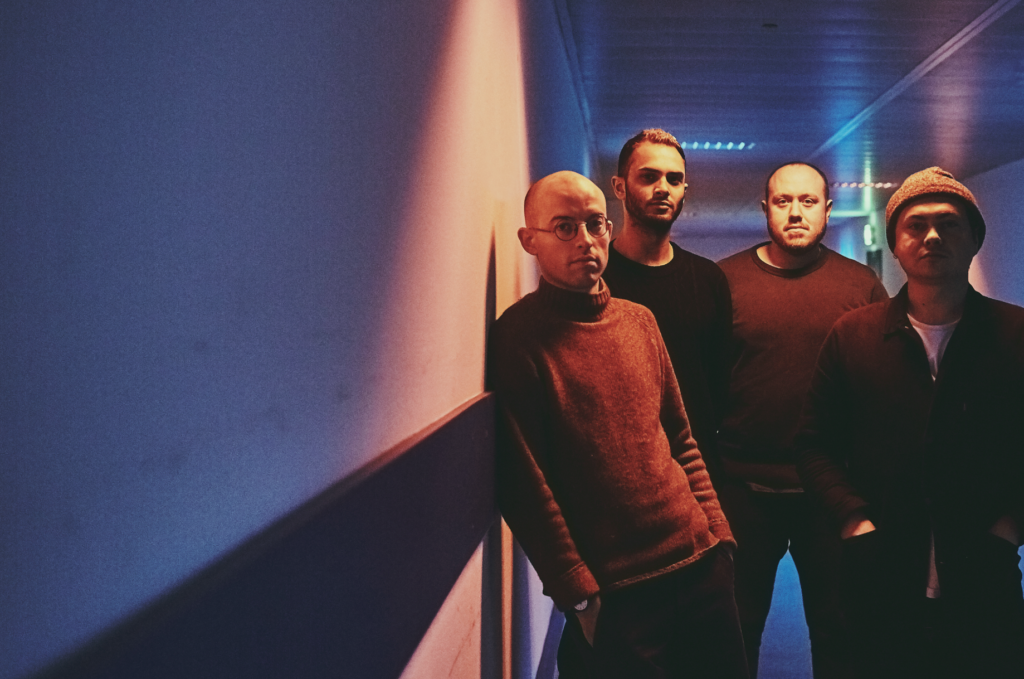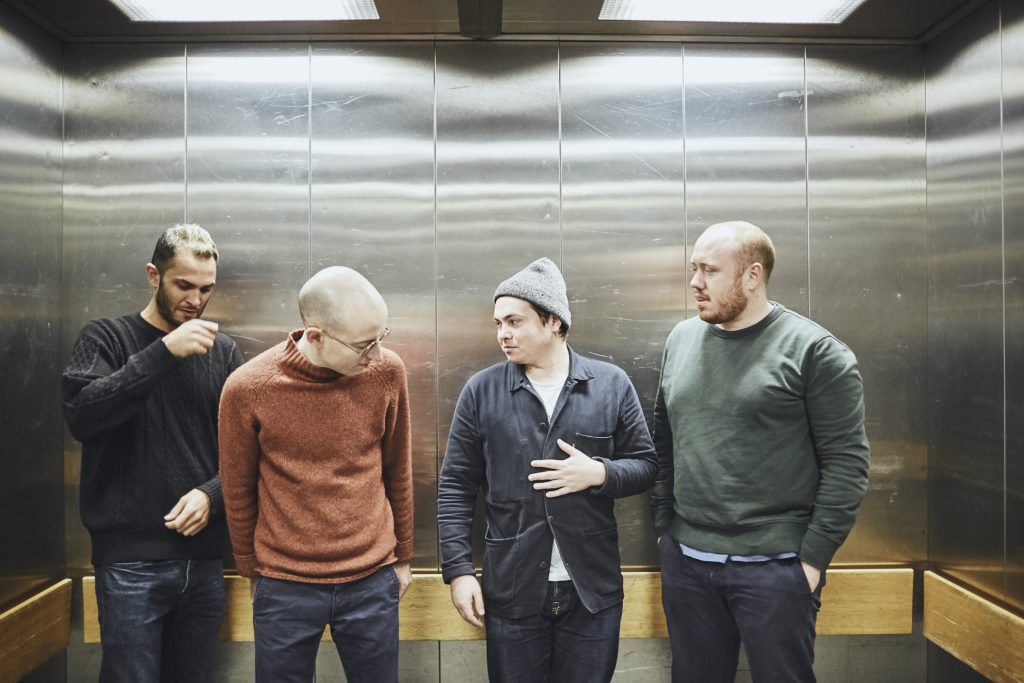Foto-© Bruno Tenschert
Wenn man die Bestenlisten des Vorjahrs studiert, merkt man einmal mehr, wie häufig heute Einzelperformer und nicht so sehr Bands in Resümees auftauchen. Von daher war es nur folgerichtig, dass die Mitglieder des Bombay Bicycle Club vor vier Jahren für unbestimmte Zeit das Betriebsende verkündeten. Was soll das ganze Gruppendenken, wenn es auch alleine geht? Sänger Jack Steadman und Bassist Ed Nash machten sich selbständig und veröffentlichten Musik unter den Namen Mr Jukes und Toothless. Womöglich werden sie diese Projektstränge in Zukunft ausbauen. Erst einmal gilt das Hauptaugenmerk aber wieder der Band, die ja immer etwas anders klang. Vielleicht nicht gleich auf ihrer ersten EP The Boy I Used To Be, damals orientierte man sich am Jangle-Pop der Achtziger. Mit jedem folgendem Arbeitsschritt wurde mehr und mehr klar, dass sich die Jungs nicht auf Indie-Rock gängiger Prägung versteifen. Bestandteile aus anderen Genres, aus Folk, Weltmusik, Soul oder Hip-Hop, sind ihnen ebenso wichtig. Das ist nun auch auf Everything Else Has Gone Wrong so. Wieder einmal erfreut die gefühlvolle Mischung aus Melodie, Groove und Spielerei, zudem sagen sie, was sie denken. „I guess I made my peace again, and yes I found my second wind, and yes I found some hope again“, lässt Steadman im Titelsong wissen. Schön, dass es ihm im Angesicht neuen Aufwinds wieder richtig Spaß macht. Wir unterhielten uns mit ihm und Gitarrist Jamie MacColl über Trennungsgründe, Alternativen, Arbeitsmethoden und natürlich den Brexit.

Sometimes it‘s difficult to find the first question for a band interview. Thankfully you make it very easy for us. How often have you had the chance to speak about your band breakup?
Jack Steadman: A few dozen times times, I guess. (laughs)
You‘ve made the decision after the release of your most successful album in the UK and at the end of a tour where you‘ve played in front of 20.000 fans at Earl‘s Court Arena. You‘ve been at the top of your game, why did you go for an indefinite hiatus?
Jack: You don‘t want to make any promises to people you can‘t keep. I think I especially had plans which were quite open-ended because they were music-based. If you put out a solo album, you don‘t know whether it‘s going to be one year or two years or three. We genuinely didn‘t know what was going to happen after taking a break. All that we knew was that it was time for all of us to do something new, since we were school kids and all that we‘ve done was the band. All of us wanted to see what else was out there.
Jamie MacColl: You don‘t want to be one of those bands who say that this is the last thing we‘re ever going to do and make a big deal out of it, and then come back in three or four years time. We wanted to leave it open-ended for our fans. I think Jack quite honourably also could have said I might want to do it again at some point in the near future, but didn‘t want us to spend years waiting for him to make his mind up about that. It might have probably caused a lot of resentment, if we‘d been just waiting for him to decide if he wanted to write songs for the band again. So I guess it gave us a form of closure. In some ways we ended 2014 on a real high but I also remember feeling really depressed in the week after we finished that tour.
Jack: It was like a comedown, I suppose…
Jamie: …yeah, which you always get at the end of an important period or at the end of an album. But I think we were all burnt out and slightly disillusioned with the whole thing.
Why disillusioned?
Jack: I think you do it so many times that it becomes meaningless. Obviously Earl‘s Court was a big deal, it was a grand finale. When you‘re a new band it‘s all exciting but when you‘re an experienced band it‘s like…oh, it‘s just another festival. That‘s a really depressing thing. By it stepping away for a few years you can come back and feel like a new band again and feel excited about travelling and playing.
Jamie: We‘ve reached this structured way of performing by the end. We did the same set for at least a year and we‘d say the same things in between songs. We didn‘t leave that much room for creativity and improvisation. It certainly feels more open-minded now. But yeah, it‘s difficult, I don‘t want it to seem like we took it for granted when we were doing that or weren‘t grateful for the opportunity to play in front of 20.000 people. It‘s that constant combination of extreme highs and extreme lows that can make it difficult. At least I think we‘re a bit more even-keeled now and not quite chasing those highs in the same way.
Jack: There were two styles of music that I wanted to write. With the band I was having to try and make them fight each other, the guitar indie band element on the one hand and samples, hip hop and jazz and funk on the other. That was maybe another reason why I wanted to separate this and do a solo album which is purely sample-based and hip-hop oriented. Coming back to the band I feel like I‘ve found the right avenue for that with Mr Jukes and I don‘t need to insert it into the band anymore. The album we‘ve made now sounds a bit more natural and more relaxed. It‘s not about throwing in hundreds of ideas at once. It‘s more refined, I think.

Jamie, you‘re coming from a musical family, there‘s a strong folk connection. Was it difficult for you in particular not to make music on a regular basis, since music is and has always been everywhere for you?
Jamie: I‘m not going to pretend there‘s anything like it. There‘s nothing else in the world that gives you the feeling of playing live music. I missed it enormously which is one of the reasons I wanted to do the band again. At the same time I find a lot of aspects of touring quite boring. There‘s an hour and a half a night where it‘s the most amazing feeling in the world. But then there‘s also 22 and a half hours during the rest of the day that to me are intellectually not very fulfilling because you‘re doing nothing most of the time on a plane, in a bus or dressing room. For me that‘s a difficult way to live. I feel there‘s a bit more balance this time, there‘s more life outside of the band. My family experience has definitely given me a different perspective. There is the love of music that comes from it and there‘s always been an acute understanding of the realities of being a musician and the implications of that for your family life and personal life. It has made me more wary than the average person going into this kind of career in the music industry.
In order to be safe you‘ve obtained university degrees. In which subjects?
Jamie: My undergraduate degree was in war studies and my masters was in international relations. It was all focused on politics. I like to do something with that at some point in my life…maybe we‘re doing an album about international diplomacy, which could be a first (laughs). We all have the mindset that we want to do different things. Jack wants to make make more albums on his own the way he already did under the name Mr Jukes. That‘s the same for the other guys as well. To me that‘s good, it‘s much better than to spend your life with just one thing.

Jack, you‘re the leader of the band who‘s singing, playing, writing and producing. The idea of sharing responsibilty now, does that make everything easier for you?
Jack: Yeah, absolutely. It‘s great, particularly the production side. I‘m naturally quite a perfectionist and I‘m not always sure that‘s the best way of creating music. Producer John Congleton is looking at the bigger picture and works instinctively and quickly. He forces you to realize you don‘t have to live or die by the music, it‘s not that important. The audience will always care about the simple song behind the production. I feel my outlook on music has changed since working with him, which I think at this stage in life is quite cool. The whole reason to work with someone new is to put you outside of your comfort zone and change the way you work. I‘m happy that I did it.
How does Ed‘s bigger contribution to songwriting influence the way of working?
Jack: Ed probably had songs like this all along, but he‘s got this confidence now to bring them into us because of his experience. And I think we wanted the songs of his on the album because we felt they fitted thematically with the record. A song like Good Day is kind of about your anxieties and worries and your melancholy and then realizing you aren‘t in control of it and you can just snap out of it. Also I think Ed brought a kind of more classic and simple way of songwriting to the record which we all thought was a nice break from some of the songs I write. They sometimes tend to be quite dense, there‘s a lot of ideas being thrown at you.
The album starts with a sense of uncertainty or even reluctance in Get Up and ends with moments of light in Racing Stripes. There are musical changes too. Are you in general more keen to allow variation into your world of songwriting?
Jack: I think we‘ve always tried to have a trajectory with an album but it‘s never been obvious in the lyrics. This is the first album where we link the songs with a lyrical theme whereas before it was purely musical ideas that would have a cyclical nature.
Jamie: I think reluctance is quite an interesting word because Get Up and I Can Hardly Speak seem to be about Jack‘s reluctance to be the front man of the band and have a lot of pressure put on you, a lot of pressure to have something to say and be extroverted and to be the public figure…
Jack: …outspoken, yeah…
Jamie: …and the difficulty you have wrestling with that by being more naturally introverted in a world of extroverted people. I think there are great lyrics on the last couple of albums but they were at times more vague. To me the lyrics are more directly linked to Jack‘s lived experience now.
Jack: Yeah, that‘s true. We do like music that is accessible, but that doesn‘t mean it always has to be done in one sort of way. We‘re interested in trying to continue to re-invent ourselves with each album through our eclectic taste. We never felt we owed anyone consistency. Our fanbase has always been quite open-minded over the years. I mean, if a fan sticks with you when your second album is acoustic and your first is completely different, then they‘ll stay with you for the rest of your career, I assume. That‘s quite loyal. By doing that early in our career we set the precedent to be more experimental.

Let‘s take the track Do You Feel Loved? as an example. Musically it seems to be linked to worldly folky sounds. Where do these elements come from?
Jack: It comes from sampling records. It‘s a flute sample, similar to what I did on my solo album. It has to do with hip hop culture of sampling different sounds and making something new from it, but doing it in the context of a band. That‘s kind of how I write a lot of my songs. Rather than sitting with a guitar and writing some words I start with someone else‘s sound and use that as a springboard or inspiration. It just helps me. You know, the first sentence is always the hardest thing to write in an essay. It‘s same for me with music. The first idea…once I‘ve got that, the rest comes quickly. If you can steal that first thing, it‘s a lot easier…(laughs)
What kind of style of hip hop do you prefer?
Jack: I like the early nineties period when people sampled a lot of jazz records like Q-Tip and J Dilla. Madlib is still making very interesting music with Freddie Gibbs, I can only recommend that. I prefer it to the more current Young Thug style.
Jamie: Last summer, because it was the 10th anniversary of our first album, I was going back listening to a lot of early demos. Jack had made two or three albums by the time the band had started when we were 13 or 14. The music on that is weirder than anything we‘ve probably done since. (laughs) A lot of that stuff was sampled and electronic as well. I‘m definitely up for hearing more weird stuff in that sort of way.
You are free to do what you want since you‘re not on Island Records anymore. The new album will be released on your own label Mmm…Records which already existed in the early days of your career. Do you only want to make decisions on your own now?
Jamie: We finished that deal because we‘ve done the acquired amount of records. Jack and Ed have both released solo records through Island. I think we wanted to have more control and more saying on matters regarding the use of the marketing budget. Increasingly I question the extent to which the major label model of releasing music is necessary – certainly not for an established band where you don‘t have big upfront marketing money that can break the band. You‘re so much on the whim of the label if the first single doesn‘t go well. They can stop marketing the album if that‘s what they see fit. We don‘t want to make ourselves vulnerable to that kind of thing at this stage of our career.

Of course we must not forget the other important subject starting with the letter B. You make it very easy again, since an allusion to Brexit topic is included in your video to Eat, Sleep, Wake (Nothing But You). In it you say British society crumbled without your music. How do you experience that crumbling in your personal life on an everyday level?
Jamie: I don‘t feel that society is crumbling yet. If you look at a country like Venezuela or at Hong Kong over the last few weeks, you can see they‘ve been close to a fundamental breakdown of law and order where the state loses its grip on power. I think in the UK society isn‘t crumbling yet, but it does feel that it‘s never been this bad. Brexit is obviously just kind of a manifestation of the increasingly poisonous divisions in British society between rich and poor and urban and rural people. To be honest I‘m actually hopeful about politics in general in the UK. The thing I‘m not hopeful about more than anything is climate change and the implications of that. Something I‘m wrestling with is what the role of musicians is in all of this. Are we meant to be journalists who narrate and observe what‘s going on, are you meant to influence it? Or are we meant to try to provide people with a kind of escape from it and entertain them and make them forget about what‘s going on around them? I don‘t think none of those options are necessarily right or wrong, it‘s just what you want to do and what you can pull off. I don‘t think that we can act like Rage Against The Machine and go: Fuck you, Boris Johnson! I don‘t like him, but I‘m not sure I can tell him to fuck off in a song in a more subtle way.
Jack: I think we‘re better at providing the escapism to people having just one part of their life which is still positive and optimistic. We want to give them a place where they can forget about things when they come to our show.
Bombay Bicycle Club Tour:
15.03.2020 Backstage Werk, München
18.03.2020 Huxleys, Berlin
24.03.2020 Live Music Hall, Köln
25.03.2020 Docks, Hamburg










